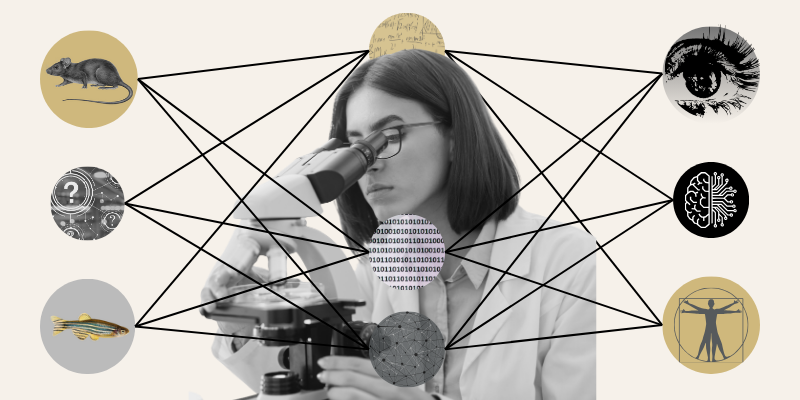This year marked the one-year anniversary of the Department of Biomedical Informatics (DBMI) at the University of Colorado School of Medicine and along with that celebration came many more, ranging from crucial research to exciting new grant announcements.
As 2023 comes to an end, join the communications staff in revisiting some of the most important stories from the year and looking to what’s next for DBMI faculty and researchers.
How Trustworthy is Your Dog’s DNA Test?
This year’s most-read story in the DBMI newsroom sought to answer one big question: Should you trust your dog’s DNA test results?
Department chair Casey Greene, PhD, and researcher Halie Rando, PhD, began this research in 2021 after Greene had a conversation at a meeting about whether the tests were reliable. The pair of researchers explained their surprising results and why transparency is important, not just to dog owners, but to the scientific process.
CU Data Researchers Connect Diet to Changes in the Microbiome
Research published this year by DBMI data scientists and others in the CU School of Medicine aimed to understand the relationship between changes in diet and the microbiome. Some of that work uncovered possible routes by which alterations in gut microbiota may influence metabolism during a dietary weight loss intervention.
"We looked at different measures of alpha diversity that take into account various features of diversity," explained DBMI assistant professor Maggie Stanislawski, PhD. "They all increased in the first three months of this intervention, which is great. When we looked at differences between the two intervention groups, there weren't really any differences in terms of alpha diversity."
Stanislawski and others in the department shared their work and how diet impacts the microbiome, its diversity, and also the rest of the body.
A Taste of the Future: CU Researcher Links Genetics with Dietary Intake
More than three years ago, assistant professor and geneticist Joanne Cole, PhD, made a novel discovery that 814 regions in the human genome are associated with dietary intake and 300 are linked to the consumption of specific foods. This year, we caught up with the researcher before a presentation for the American Society for Nutrition 2023 Annual Meeting, where she dived into whether genes have a direct or indirect impact on dietary intake.
What does Cole’s work mean for the future? She told us that the connections between food preference and genetics could one day be used to achieve personalized nutrition and open up a whole world of opportunity.
AI-Powered Tool Uses Hospital Nursing Notes To Save Lives
An AI-powered predictive tool developed by associate professor David Albers, PhD, made waves in health care this year.
We spoke to Albers about what inspired him to create the Communicating Narrative Concerns Entered by RNs (CONCERN) Clinical Decision Support (CDS) system and how it’s being implemented and tested in health systems across the country.
Altitude Research Reaches New Heights
This summer, associate professor Colleen Julian, PhD, received a $500,000 grant to study metabolic adaptation to high altitude, but that might just be the beginning for such critical research.
Understanding hypoxia, which happens when there isn’t enough oxygen being delivered throughout the body, its relation to altitude, and how the body acclimates to having less oxygen could help researchers understand other diseases where a lack of oxygen is relevant.
Julian took us on a journey from Oregon to Bolivia, where her initial research took place, and showed how her work plays an important role in medicine.
AI-Assisted Authoring Tool Offers Timesaving and Transparency
DBMI researchers this year unveiled a new artificial intelligence-integrated workflow that improves academic manuscripts. We detailed how the new technology works and what it means for the future of academics and research.
“I think it will be a huge help for the community to use these tools, incorporate them into our lives, but in a transparent way – perfectly documenting how we use it,” explained Milton Pividori, PhD, who joined department faculty in May.
What is Cell Painting?
These fantastical-looking images almost look like holiday lights, explained DBMI PhD student Michael Lippincott, but they are actually florescent stains of cells that help researchers see how cell parts change. Lippincott often uses this assay in the Way Lab.
We looked at some mesmerizing cell painting images, the process, and how this assay is evolving in science.
Researchers Amplify Diverse Sourcing in Science Journalism
Data analysis can have big real-world impacts, as was the case when department chair Casey Greene, PhD, and postdoctoral researcher Natalie Davidson, PhD, discovered that nearly 70% of people quoted directly in Nature’s journalism articles identified as male.
Earler this year, the publication announced it was implementing new policies to improve the diversity of its sources. Greene and Davidson shared their work and how diverse sourcing in journalism can be equally important for the scientific process.
How CU Data Scientists Are Debunking COVID-19 Misinformation
DBMI researchers proved this year just how far data analysis can go in the health world. By leveraging a novel open-source publishing tool and software development platform GitHub, researchers were able to lead an international effort to curate accurate research about the COVID-19 pandemic.
“We have written what is essentially a book about COVID-19 that has been relatively well cited,” explained researcher Halie Rando, PhD. “It’s much more dynamic than a typical manuscript. Our understanding of this weird virus continues to evolve, and this manuscript tells the story.”
This story continues to develop with new contributors adding more COVID-19 literature to the project.
CU Data Scientists Awarded Grants to Further Orthopedics Research
This year marked a milestone in collaboration for the department. In October, four research projects with a combined orthopedic and biomedical informatics focus were awarded grant funds totaling $200,000 in the newly formed Dyads Pilot Award competition.
“The long-term goal of this program is to nurture a community at the intersection of informatics and cutting-edge musculoskeletal discovery science,” competition organizers say.
The 12-month grants cover topics ranging from intermittent fasting’s impact on bone density to infections that occur around metal implants and hardware.












.png)
